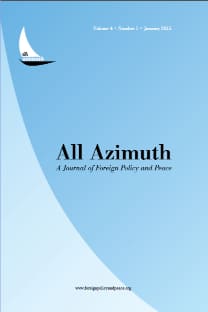Knowledge, Repetition and Power in Ibn al-‘Arabi’s Thought: Some Preliminary Comments on Methodology
Knowledge, Repetition and Power in Ibn al-‘Arabi’s Thought: Some Preliminary Comments on Methodology
Ibn al-‘Arabi, the cosmos, knowledge, repetition, interpretation, delimitation power,
___
- Acharya, Amitav. “Dialogue and Discovery: In Search of International Relations Theories Beyond The West.” Millenium: Journal of International Studies 39, no. 3 (2011): 619-37.
- Acharya, Amitav, and Barry Buzan. “Why is There No Non-Western International Relations Theory? An Introduction.” International Relations of the Asia-Pacific 7, no. 3 (2007): 287-312.
- Almond, Ian. Sufism and Deconstruction: A Comparative Study of Derrida and Ibn’Arabi. London: Routledge, 2004.
- Aydınlı, Ersel, and Julie Mathews. “Periphery Theorising for a Truly Internationalised Discipline: Spinning IR Theory Out of Anatolia.” Review of International Studies 34, no. 4 (2008): 693-712.
- Behera, Navnita Chadha. “Re-imagining IR in India.” International Relations of the Asia-Pacific 7, no. 3 (2007): 341-68.
- Biltekin, Gonca. “Batı-dışı Uluslararası İlişkiler Teorileri ve Özgün Kuram.” In Uluslararası İlişkiler Teorileri, edited by Ramazan Gözen, 517-64. İstanbul: İletişim, 2014.
- Chakrabarty, Dipesh. “Postcoloniality and the Artifice of History: Who Speaks for ‘Indian’ Pasts?” Representations 37 (1992): 1-26.
- Chittick, William C. The Sufi Path of Knowledge: Ibn al-ʻArabi’s Metaphysics of Imagination. Albany: Suny Press, 1989.
- Crawford, Robert M.A. “Where Have All Theorists Gone- Gone to Britain? Everyone? A Story of Two Parochialisms in International Relations.” In International Relations—Still an American Social Science?: Toward Diversity, edited by Robert M.A. Crawford and Darryl S.L. Jarvis, 221-42. Albany: SUNY University Press, 2001.
- Foucault, Michel. The History of Sexuality: An Introduction. Translated by Robert Hurley. New York: Vintage Books, 1990.
- Haj Yousef, Mohamed. Ibn ‘Arabi’: Time and Cosmology. New York: Routledge, 2008.
- Heidegger, Martin. “‘Only a God Can Save Us’: Der Spiegel Interview with Martin Hedegger (1966).” In The Heidegger Controversy: A Critical Reader, edited by Richard Wolin, 91-116. U.S.: MIT Press, 1993.
- Hoffmann, Stanley. “An American Social Science: International Relations.” Daedalus 106, no. 3 (1977): 41-60.
- Holsti, Kal J. The Dividing Discipline. Winchester, Mass.: Allen & Unwin, 1985.
- Ibn al-ʻArabī. The Bezels of Wisdom. Translated by Ralph Austin. New Jersey: Paulist Press, 1980.
- Ibn Arabi, Muhyiddin. Contemplation of the Holy Mysteries. Translated by Cecilia Twinch and Pablo Beneito. Oxford: Anqa Publishing, 2008.
- -- . Fütuhat-ı Mekkiye. Translated by Ekrem Demirli. 18 vols. Istanbul: Litera Yayıncılık, 2006-2012.
- Norbu, Dawa. “Tibet in Sino-Indian Relations: The Centrality of Marginality.” Asian Survey 37, no. 11 (1997): 1078-95.
- Pasha, Mustapha Kamal. “Untimely Reflections.” In International Relations and Non-Western Thought, edited by Robbie Shilliam, 217-26. London & New York: Routledge, 2011.
- Said, Edward. Orientalism. London: Penguin Classics, 2003.
- Scholem, Gershom. On the Kabbalah and Its Symbolism. The United States of America: Schocken Books, Scholem, 1996.
- Smith, Tony. “Requiem or New Agenda for Third World Studies.” World Politics 37, no. 4 (1985): 532-62.
- Spivak, Gayatri C. “Can the Subaltern Speak?” In Marxism and the Interpretation of Culture, edited by C. Nelson and L. Grossberg, 217-313. Champaign, IL: University of Illinois Press, 1988.
- Tickner, Arlene B. and David L. Blaney. Claiming the International: Worlding Beyond the West.London: Routledge, 2013.
- Wiarda, Howard. “The Ethnocentrism of the Social Science: Implications for Research and Policy.” The Review of Politics 43 (1981): 163-97.
- Wæver, Ole. “The Sociology of a Not So International Discipline: American and European Developments in International Relations.” International Organization 52, no. 4 (1998):687-727.
- Xuetong, Yan. Ancient Chinese Thought and Modern Chinese Power. New Jersey: Princeton University Press, 2011.
- -- . “Xun Zi’s Thoughts on International Politics and Their Implications.” Chinese Journal of International Politics 2, no. 1 (2008): 135-65.
- ISSN: 2146-7757
- Yayın Aralığı: 2
- Başlangıç: 2012
- Yayıncı: Dış Politika ve Barış Araştırmaları Merkezi, İhsan Doğramacı Barış Vakfı
International Relations Theories and Turkish International Relations: Observations Based on a Book
Knowledge, Repetition and Power in Ibn al- Arabi's Thought: Some Preliminary Comments on Methodology
Transatlantic Security, Defence and Strategy: Badly Needed Reforms*
Interpreting Turkey’s Middle East Policy in the Last Decade
Transatlantic Security, Defence and Strategy: Badly Needed Reforms
An Inter-Subsystemic Approach in International Relations
Knowledge, Repetition and Power in Ibn al-‘Arabi’s Thought: Some Preliminary Comments on Methodology
Interpreting Turkey's Middle East Policy in the Last Decade*
